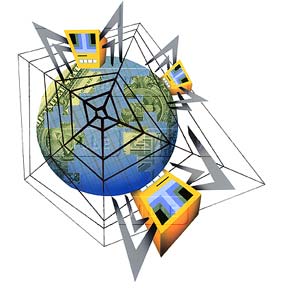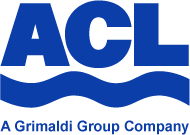ELECTRONIC DATA INTERCHANGE
E-Commerce:
 E-Commerce at Atlantic Container Line consists of two different but related initiatives. One is Electronic Data Interchange (EDI) and the other is interactive Web access via the ACL web. The differences between these two alternatives is that EDI might typically be used when there is some volume of data moving between ACL and its customers/vendors or when the customer/vendor already has a back-end system capable of receiving or generating the data. Web access, on the other hand, is very handy for small data volumes and for discrete, one-off transactions - ideal for container tracking and to request a quote or for small vendors to provide us with important information. Internet access is so easy and inexpensive now that almost everyone can get involved no matter where they are.
E-Commerce at Atlantic Container Line consists of two different but related initiatives. One is Electronic Data Interchange (EDI) and the other is interactive Web access via the ACL web. The differences between these two alternatives is that EDI might typically be used when there is some volume of data moving between ACL and its customers/vendors or when the customer/vendor already has a back-end system capable of receiving or generating the data. Web access, on the other hand, is very handy for small data volumes and for discrete, one-off transactions - ideal for container tracking and to request a quote or for small vendors to provide us with important information. Internet access is so easy and inexpensive now that almost everyone can get involved no matter where they are.
Web Access:
 ACL has had a Web site since early 1997, which was initially used to provide customers with important reference information like equipment specifications, inland tariffs and vessel schedules. We have also provided the ability for customers to request a quote, or send booking or bill-of-lading information to us. Currently our site delivers on-line container or shipment tracing and allows inland vendor depots to input container movement information directly into our database. In the future we plan to increase these capabilities to include more of the functions that our customers and vendors wish to use.
ACL has had a Web site since early 1997, which was initially used to provide customers with important reference information like equipment specifications, inland tariffs and vessel schedules. We have also provided the ability for customers to request a quote, or send booking or bill-of-lading information to us. Currently our site delivers on-line container or shipment tracing and allows inland vendor depots to input container movement information directly into our database. In the future we plan to increase these capabilities to include more of the functions that our customers and vendors wish to use.
Electronic Data Interchange (EDI):
 Here at ACL we have utilized EDI for over 15 years making intense use of it with our vendors providing them with information necessary to handle our business and receiving information from them that we use to manage our cargo and containers. Of course we also use EDI with a variety of government agencies as well as marine terminals to promote the seamless export and import of goods and merchandise. Internally we look to constantly improve the accuracy, timeliness and completeness of this data, which will continue to keep us an efficient and cost effective transport service.
Here at ACL we have utilized EDI for over 15 years making intense use of it with our vendors providing them with information necessary to handle our business and receiving information from them that we use to manage our cargo and containers. Of course we also use EDI with a variety of government agencies as well as marine terminals to promote the seamless export and import of goods and merchandise. Internally we look to constantly improve the accuracy, timeliness and completeness of this data, which will continue to keep us an efficient and cost effective transport service.
The use of EDI with customers is a constantly growing phenomenon. For customers to become EDI trading partners they must have some internal system capable of retaining data we can send them or be able to generate the data that would normally be sent to the ship line. They must also have some ability to convert between internal data formats and established international EDI message formats (typically, ANSI and EDIFACT).
Our goal in exchanging this data is to reduce common paper and manual transactions and/or allow you to produce any required paper documentation at your site. This enables ACL to provide all parties involved with the highest levels of service. We will request that you sign a Trading Partner Agreement in order to extend the Terms & Conditions of the Bill of Lading to the EDI transaction. ACL currently supports most of the primary message types used in the ocean-borne transportation industry. We also support the use of ANSI X12 Version 3030 (This also needs to be verified) and EDIFACT.
We are fully prepared to test and implement EDI with your company. If you are interested or for more information, please contact these ACL EDI Specialists:
In North America: |
In Europe: |
|
Ms. Loren Paul |
Mr. Jaap Dijksman |
EDI STANDARDS DOCUMENT TYPE |
||
| ANSI |
X12
|
EDIFACT |
| Booking Request |
300
|
IFTMBF |
| Booking Confirmation |
301
|
IFTMBC |
| B/L Instructions |
304
|
IFTMIN |
| Ocean Manifest |
309
|
IFTMCS |
| Export B/L Invoice |
310
|
INVOIC |
| Import Arrival Notice |
312
|
IFTMAN |
| Shipment Status Updates |
315
|
IFTSTA |
| Gate Activity |
322
|
CODECO |
| Electronic Funds Transfer |
820
|
|
